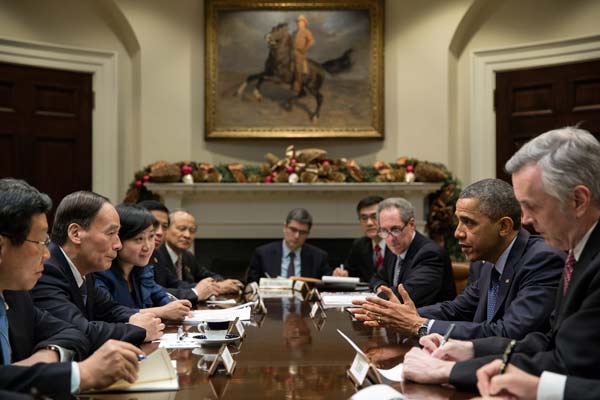Leaders 'value US relations'
Updated: 2012-12-22 01:00
By Li Xiaokun (China Daily)
|
||||||||
Chinese leaders as always highly value ties with the United States, Vice-Premier Wang Qishan told US President Barack Obama in Washington on Thursday.
Obama told Wang he is expecting an early meeting with China's top political leader Xi Jinping.
 |
|
Vice-Premier Wang Qishan (second from left) meets US President Barack Obama in Washington on Thursday. [Photo/Xinhua] |
The first meeting between a Chinese official and the US president since the leadership transition in China came the day the US House of Representatives passed the $633 billion Defense Authorization Act of 2013. The act contains sections about arms sales to Taiwan and supporting Japan's so-called administration right of the Diaoyu Islands, two moves China sees as harming its core interests.
This reflects Washington's two-way China policies, experts said, adding the anti-China group in the US political field might shadow relations after leadership transitions in both countries.
Wang was in the US for the 23rd Session of China-US Joint Commission on Commerce and Trade. He stressed the importance of building a new type of relations between major countries and called for both sides to "accumulate positive energy".
Against the backdrop of the global economic downturn, Obama said, promoting energetic and effective economic relations is still the core of US-China relations.
Tao Wenzhao, a professor on US studies with the Chinese Academy of Social Sciences, said Wang's call for accumulating "positive energy" for China-US relations echoes similar remarks earlier this month by Xi when meeting former US president Jimmy Carter.
"That showed the coherence of the Chinese leadership on US policies," he said.
Wang wrapped up his three-day visit to the US on Thursday. During the trade talks, Chinese and US officials agreed on a number of measures, including a US pledge for fairer treatment of Chinese investment in the US and further relaxation of its technology export controls.
When addressing the session, Wang urged the US to end political scrutiny of Chinese investors.
He said that US residents are not asked similar questions about their political involvement when investing abroad. "How can you check if they belong to the Communist Party or other parties?"
In October, the US accused two Chinese telecom equipment manufacturers, Huawei Technologies and ZTE, of posing a potential threat to US national security due to possible influence on the companies by Chinese authorities.
On Thursday evening, the US House of Representatives passed the Defense Authorization Act of 2013, and the Senate is expected to pass the Pentagon budget on Friday.
The budget contains two controversial sections relating to China. The two clauses are both written as "sense of Congress," which means they have no binding power over the president.
The first said "it is the sense of Congress that ... the president should take steps to address Taiwan's shortfall in fighter aircraft, whether through the sale of F-16 C/D aircraft or other aircraft of similar capability."
The other section said "it is the sense of Congress that" although the US side takes no position on the ultimate sovereignty of the Diaoyu Islands, it "acknowledges the administration of Japan" over them.
Earlier this month, Foreign Ministry spokesman Hong Lei said the US has repeatedly stated that it will not take sides on territorial disputes between China and Japan, and it "should not send out signals that conflict with each other".
At a news briefing earlier this year, Hong urged "some US lawmakers" to get rid of their Cold War mentality and stop pushing for arms sales to Taiwan and interfering in China's internal affairs.
In recent years, China-US military exchanges have run into several interruptions caused by US arms deals to Taiwan.
Obama's high expectations on relations with China and the irritating Pentagon budget, coming on the same day, is a typical reflection of Washington's two-way China policies, said Liu Hui, another scholar of US studies at the Chinese Academy of Social Sciences.
"Despite negative factors, China-US relations will arduously move ahead after the leadership transition," he said.
- China, US agree on major trade measures
- China-US trade talks conclude with positive results
- China, US kick off annual trade talks
- China, US move beyond distractions to new relations
- Xi pursues better ties between China, US
- China, US hold wide-ranging defense talks
- Vice-premier to co-chair China-US trade talks
- Xi Jinping says China-US ties to flourish

 Relief reaches isolated village
Relief reaches isolated village
 Rainfall poses new threats to quake-hit region
Rainfall poses new threats to quake-hit region
 Funerals begin for Boston bombing victims
Funerals begin for Boston bombing victims
 Quake takeaway from China's Air Force
Quake takeaway from China's Air Force
 Obama celebrates young inventors at science fair
Obama celebrates young inventors at science fair
 Earth Day marked around the world
Earth Day marked around the world
 Volunteer team helping students find sense of normalcy
Volunteer team helping students find sense of normalcy
 Ethnic groups quick to join rescue efforts
Ethnic groups quick to join rescue efforts
Most Viewed
Editor's Picks

|

|

|

|

|

|
Today's Top News
Health new priority for quake zone
Xi meets US top military officer
Japan's boats driven out of Diaoyu
China mulls online shopping legislation
Bird flu death toll rises to 22
Putin appoints new ambassador to China
Japanese ships blocked from Diaoyu Islands
Inspired by Guan, more Chinese pick up golf
US Weekly

|

|






